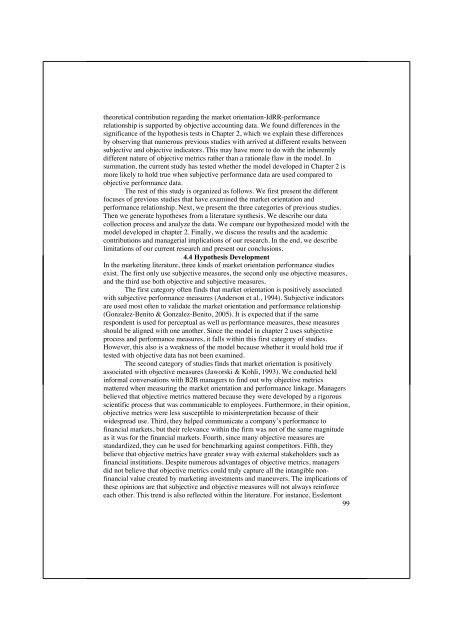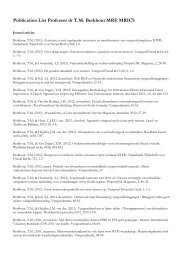Essays on supplier responsiveness and buyer firm value - Nyenrode ...
Essays on supplier responsiveness and buyer firm value - Nyenrode ...
Essays on supplier responsiveness and buyer firm value - Nyenrode ...
You also want an ePaper? Increase the reach of your titles
YUMPU automatically turns print PDFs into web optimized ePapers that Google loves.
theoretical c<strong>on</strong>tributi<strong>on</strong> regarding the market orientati<strong>on</strong>-IdRR-performance<br />
relati<strong>on</strong>ship is supported by objective accounting data. We found differences in the<br />
significance of the hypothesis tests in Chapter 2, which we explain these differences<br />
by observing that numerous previous studies with arrived at different results between<br />
subjective <strong>and</strong> objective indicators. This may have more to do with the inherently<br />
different nature of objective metrics rather than a rati<strong>on</strong>ale flaw in the model. In<br />
summati<strong>on</strong>, the current study has tested whether the model developed in Chapter 2 is<br />
more likely to hold true when subjective performance data are used compared to<br />
objective performance data.<br />
The rest of this study is organized as follows. We first present the different<br />
focuses of previous studies that have examined the market orientati<strong>on</strong> <strong>and</strong><br />
performance relati<strong>on</strong>ship. Next, we present the three categories of previous studies.<br />
Then we generate hypotheses from a literature synthesis. We describe our data<br />
collecti<strong>on</strong> process <strong>and</strong> analyze the data. We compare our hypothesized model with the<br />
model developed in chapter 2. Finally, we discuss the results <strong>and</strong> the academic<br />
c<strong>on</strong>tributi<strong>on</strong>s <strong>and</strong> managerial implicati<strong>on</strong>s of our research. In the end, we describe<br />
limitati<strong>on</strong>s of our current research <strong>and</strong> present our c<strong>on</strong>clusi<strong>on</strong>s.<br />
4.4 Hypothesis Development<br />
In the marketing literature, three kinds of market orientati<strong>on</strong> performance studies<br />
exist. The first <strong>on</strong>ly use subjective measures, the sec<strong>on</strong>d <strong>on</strong>ly use objective measures,<br />
<strong>and</strong> the third use both objective <strong>and</strong> subjective measures.<br />
The first category often finds that market orientati<strong>on</strong> is positively associated<br />
with subjective performance measures (Anders<strong>on</strong> et al., 1994). Subjective indicators<br />
are used most often to validate the market orientati<strong>on</strong> <strong>and</strong> performance relati<strong>on</strong>ship<br />
(G<strong>on</strong>zalez-Benito & G<strong>on</strong>zalez-Benito, 2005). It is expected that if the same<br />
resp<strong>on</strong>dent is used for perceptual as well as performance measures, these measures<br />
should be aligned with <strong>on</strong>e another. Since the model in chapter 2 uses subjective<br />
process <strong>and</strong> performance measures, it falls within this first category of studies.<br />
However, this also is a weakness of the model because whether it would hold true if<br />
tested with objective data has not been examined.<br />
The sec<strong>on</strong>d category of studies finds that market orientati<strong>on</strong> is positively<br />
associated with objective measures (Jaworski & Kohli, 1993). We c<strong>on</strong>ducted held<br />
informal c<strong>on</strong>versati<strong>on</strong>s with B2B managers to find out why objective metrics<br />
mattered when measuring the market orientati<strong>on</strong> <strong>and</strong> performance linkage. Managers<br />
believed that objective metrics mattered because they were developed by a rigorous<br />
scientific process that was communicable to employees. Furthermore, in their opini<strong>on</strong>,<br />
objective metrics were less susceptible to misinterpretati<strong>on</strong> because of their<br />
widespread use. Third, they helped communicate a company’s performance to<br />
financial markets, but their relevance within the <strong>firm</strong> was not of the same magnitude<br />
as it was for the financial markets. Fourth, since many objective measures are<br />
st<strong>and</strong>ardized, they can be used for benchmarking against competitors. Fifth, they<br />
believe that objective metrics have greater sway with external stakeholders such as<br />
financial instituti<strong>on</strong>s. Despite numerous advantages of objective metrics, managers<br />
did not believe that objective metrics could truly capture all the intangible n<strong>on</strong>financial<br />
<strong>value</strong> created by marketing investments <strong>and</strong> maneuvers. The implicati<strong>on</strong>s of<br />
these opini<strong>on</strong>s are that subjective <strong>and</strong> objective measures will not always reinforce<br />
each other. This trend is also reflected within the literature. For instance, Esslem<strong>on</strong>t<br />
99
















